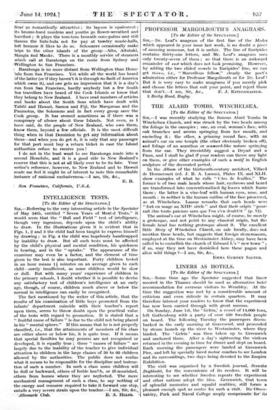INTELLIGENCE TESTS.
[To the Editor of the SPECTATOR.] SLR.,—Referring tOthe very interesting article in the Spectator of May 24th, entitled "Seven Years of Mental Tests," it would seem that the "Ball and Field" test of intelligence, though very ingenious, depends upon the child's ability to draw. In the illustrations given it is evident that in Figs. 1, 2 and 3 the child had been taught to express himself by drawing ; in Fig. 4 the child was hopelessly handicapped by inability to draw. But all such tests must be affected by the child's physical and mental condition, his quickness in hearing, and in the "uptake." The appearance of the examiner may' even be a factor, and the element of time given to the test is also important. Forty children tested in an hour means 11 minutes on an average given to each child—surely insufficient, as some children would be slow or dull. But with many years' experience of children in the primary schools, I doubt whether it is possible to devise any satisfactory test of children's intelligence at an early age, though, of course, children much above or below the normal in intelligence can easily be recognized.
The fact mentioned by the writer of this article, that the results of his examination of little boys promoted from the infants' department coincide with their teacher's report upon them, seems to throw doubt upon the practical value of the tests with regard to promotion. It is stated that a "fruitful cause of failure" is due to the child not being placed in his" mental sphere." If this means that he is not properly classified, i.e., that the attainments of members of his class are either above or below his, it is quite true. If it means that special faculties he may possess are not recognized or developed, it is equally true ; these "causes of failure" are largely due to the inability of the teacher to give individual' attention to children in the large clashes' of 50 to 60 children allowed by the authorities. The public does not realize what it means to be responsible for the discipline and instruc- tion of such a number: In such a class some children -will be dull or backward, others of feeble health, or ill-nourished, others from homes where they are neglected. The mere mechanical management of such a class, to say nothing of the energy and resource required to take it forward one step, entails a very severe strain upon the teacher.—I ant; Sir, &e.,










































 Previous page
Previous page